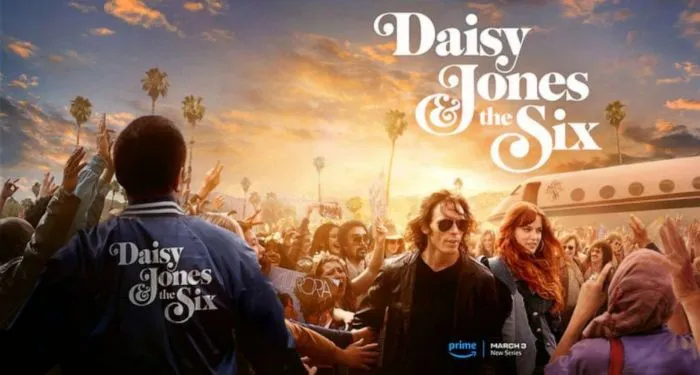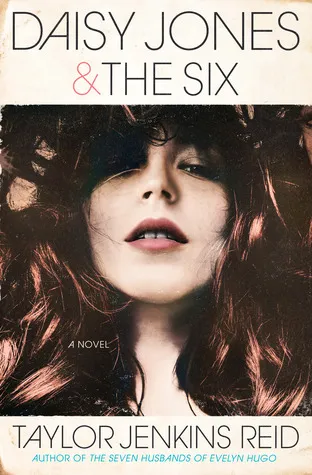
DAISY JONES & THE SIX is a Rip-Off, But Don’t We Like It That Way?
Ever since Taylor Jenkins Reid published The Seven Husbands of Evelyn Hugo in 2017, the author who began her career writing new adult romance novels has carved out a highly successful niche of fiction writing — creating narratives for fictional celebrities that draw inspiration from real-life celebrity culture.
Reid followed the success of Evelyn Hugo with the equally popular Daisy Jones & The Six in 2019, which reads as an oral history of a fictional ‘70s rock band that fell apart as inexplicably as they began. Where I found Evelyn Hugo underwhelming, I loved Daisy Jones so much that I read it for a second time two years later, comforted by the narrative of characters that felt familiar even though they were new to me.
While Reid’s characters from these novels are very much her own, they are so heavily influenced by real-life celebrities and the popular culture of their time that, for enthusiasts of such areas, it feels like stories we’ve already read before. More than anything, novels by Reid like Daisy Jones or the more recent Malibu Rising and Carrie Soto is Back cause readers to wrestle with a sense of nostalgia they didn’t even know they were looking for.
Especially if you grew up combing the news for details about the lives of your own favorite celebrities, these books allow readers to kick back with a story they know all too well only told with new characters they haven’t met before. Need a book that feels familiar but not familiar enough so as to hold your attention? Voila.
Which is why it was a bit surprising, at first, that when Daisy Jones & The Six was recently adapted into an equally successful limited series produced by Reese Witherspoon’s Hello Sunshine for Amazon Prime Video, television critics took issue with the fact that the series’ premise was not only directly inspired by real-life ‘70s bands like Fleetwood Mac, but pretty much a rip-off of said real-life stories.
Fans of the book immediately flocked to watch the series, as we do, and many found it a loose adaptation that takes a lot of creative liberty with its source material. But most of us didn’t care in the long run, since it was worth it to see such legendary albeit fictional musicians brought to life, along with their fictional album Aurora. It didn’t seem to matter that “the book was better” in this case, because even if some viewers hadn’t read the book, we know this story. We’ve all seen Almost Famous and are still here for Daisy Jones, because it’s a celebrity narrative our culture holds dear.
Of course Daisy Jones & The Six is a rip-off. Reid even confirmed in the acknowledgments of the book that it was inspired by reading oral histories of real-life rock bands, a genre with which she was previously unaccustomed. Perhaps some critics were expecting it to breathe a bit more new life into the fairy tale gone wrong that was being a rockstar in the ‘70s, and while its message does tend to get a bit lost on the series, Reid more than accomplished that in the book.
What made Daisy Jones & The Six so compelling as a novel was its ability to both transport its reader back in time while also sticking to a narrative style that indicates it was definitely written in the present as opposed to 50 years ago. Grappling with many feminist themes through characters like Daisy Jones, Karen Sirko, or Simone Jackson, Reid was able to intersperse certain events and commentary throughout the novel that just wouldn’t have flown if this was a real story written in decades past.
No real-life publisher well before the 21st century would have touched an oral history of a rock band with subjects like Karen who admitted to abortion or Daisy whose so-called abrasive nature led her to make proclamations like, “I am not a muse. I am the somebody. End of fucking story.” But since this is fiction published in 2019, such feminism can flow freely. Which is why it felt so refreshing and empowering to read lines like “men often think they deserve a sticker for treating women like people” in a novel about rockstars set in the ‘70s.
Ultimately, Daisy Jones the series tried a bit too hard to capture everything that it led to more than a little slipping through the cracks, with many creative changes seeming pointless and frustrating when taken at face value. (Not to mention that when you make a highly anticipated period drama in the year 2023, it’s hard for me to take young actors seriously when you clearly have the face of someone who knows what an iPhone is, but that’s a separate issue.) The series has its high and low points, but the fact that it’s a rip-off is neither.
It’s rather a sign of a culture so preoccupied with nostalgia and living vicariously through characters that exist in another time period, which isn’t necessarily a bad thing. This is hardly a new concept, but in an increasingly anxious age such as our own, it’s a pleasure to be able to revel in something new that doesn’t take too much brainpower to invest in, because Lord knows there’s enough else in a single day to drain us of that. The fact that Daisy Jones & The Six is a rip-off is hardly criticism — rather, it just confirms that it’s the latest export from a capitalistic machine that tries to segregate high-brow and low-brow entertainment. Feeding into that is a waste of time. So just read the book, watch the series, then come find me so we can bitch over some of the more head-scratching script changes.











